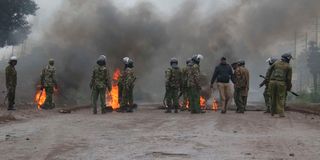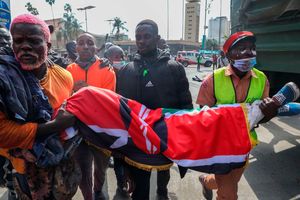
Police clear a section of the Nyeri–Nairobi highway that was barricaded by protesters in Karatina town during the Saba Saba protests on July 7, 2025.
The 35th anniversary of Saba Saba Day—that pivotal moment of July 7, 1990 which marked the beginning of the end of single-party dictatorship—yesterday was a stark reminder of the level of regression under President William Ruto’s government.
The dawn of multi-partyism was supposed to herald a brave a new world where democracy and rule of law reigned supreme. On Sunday, on the eve of Saba Saba, a group of mothers of victims of police brutality gathered at the Kenya Human Rights Commission offices in Nairobi were attacked by the notorious goons that are being deployed by the government to silence the people.
The very visible alliance between Kenya Kwanza security apparatus, leading regime politicians and hired criminal gangs marks a frightening descent into a reign of terror and anarchy that is the complete antithesis of democracy and respect for human rights.
Nearly 20 young men were killed by police around the 1st anniversary of the GenZ protests of last year where more than 60 lost their lives. The Ruto regime has responded with brutal force to the growing clamour for justice and accountability.
Kenya has become a police state where those mandated to maintain law and order have become criminals, a law unto themselves mandated by the regime to abduct, hold in illegal confinement, torture and kill citizens who dare demand their constitutional rights.
President Ruto seems determined to match, if not outdo, the excesses of his mentor and role model, Daniel arap Moi.
State-sponsored criminals
In Interior Cabinet Secretary Kipchumba Murkomen, Inspector-General of Police Douglas Kanja, Director of Criminal Investigations Mohammed Amin, National Intelligence Services Director-General Haji Noordin Haji and Director of Public Prosecutions Renson Igonga, the Kenya Kwanza regime has subverted the criminal justice system to serve the political whims of those in power.
The invasion by state-sponsored criminals of the Kenya Human Rights Commission complex on Sunday serves as a chilling replay of terror the Moi regime visited on the mothers of political prisoners during protests at Uhuru Park’s Freedom Corner so many years ago.
Then there has been the ludicrous misuse of elite police forces, including the DCI’s serious crimes unit and, reportedly, even the anti-terrorism police unit, to arrest and hold in secret detention facilities suspected protest organisers.
The regime propaganda machinery is trying in vain to link citizen demands for justice to phantom opposition coup plots. They have tried without success to pin all challenges to the regime on a non-existent Mount Kenya ethnic plot to prematurely end Ruto’s reign.
What they seem to conveniently forget is that their bogeyman of the moment, former Deputy President Rigathi Gachagua, never had anything to do with the Gen Z protests. He was not the inspiration nor the leader of the youthful revolt against dictatorship, corruption and extortionate taxation.
Like other opposition leaders or declared presidential aspirants—Kalonzo Musyoka, Martha Karua, Fred Matiang’i, Okoiti Omtatah, David Maraga, et al—the impeached Deputy President is simply trying to tap into the power of disaffected youth.
Misusing security forces
There is nothing wrong with that. There is no crime in chanting ‘Ruto must go’ or ‘Wantam’. It is within anyone’s constitutional rights to seek the presidency or any other political office. The spirit of Saba Saba was all about political rights and free expression.
Dr Ruto, during his time as Deputy President, openly rebelled against President Uhuru Kenyatta with his Hustler movement. He was not treated as a terrorist. He was not subjected to some perverse ethnic profiling by which his entire community was accused of plotting to topple the President. What he doesn’t seem to realise is that the more he drives the anti-Mt Kenya campaign, the more he radicalises the populous region and drives it more firmly into the opposition’s clutches.
The more he goes into repression mode, misusing security forces on murderous orgies against all forms of dissent, the more he alienates youthful forces who have rejected attempts to reduce everything into ethnic competition for power.
President Ruto likes to pose as assured and self-confident, but dictatorial tendencies and aversion to all forms of criticism reveal a President who is a prisoner of self-doubt and a huge inferiority complex.
Saba Saba Day would have been the ideal opportunity for serious introspection on the State of the Nation since return of multi-party democracy.
It should have been the moment to celebrate the fruits of a brave new world, but instead we can only shed tears at the broken dreams and shattered lives under rule of the gun.
One day, those with bloodstained hands will come to learn that crime doesn’t pay.







